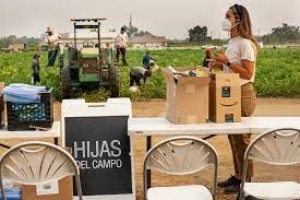According to the Hijas Del Campo (HDC) website, in California, roughly 40% of households with farmworker income are below the poverty line. A majority lack insurance coverage for health care expenses, their children don’t graduate from high school far too often and many of these families don’t take advantage of government programs for food support and health insurance.
That was the motivation for four women from Far East Contra Costa County, all of them daughters of migrants and farmworkers to create HdC, a grassroots organization aimed at breaking down the linguistic, cultural and legal barriers that hinder migrant and seasonal farmworkers and their families from accessing basic resources.
In April 2020, CHF staff began to meet regularly with the women to learn more about the needs of the campesinx (non-binary version of campesino, or farmworker) and their families and to explore how the CHF could provide support. In March 2022, shortly after HdC achieved 501(c) 3 incorporation status with the help of Gilbert Salinas, Chief Equity Officer, Contra Costa Health Services, the CHF awarded HdC a 7-month, $38,000 Executive Director discretionary grant to support contracting with La Piana Consulting to develop a strategic growth plan.
In July 2022, when two of the founders decided to move on, the CHF awarded an additional Executive Director discretionary grant for $31,000 to allow HdC to engage a part-time volunteer coordinator, ease the burden of the remaining founders and avoid service delivery interruption. HdC is currently in discussions with other foundations for support that will allow this to become a permanent position.
In December 2022, the CHF awarded HdC $100,000 for a Phase I implementation focused on strengthening HdC’s organizational infrastructure while continuing to provide direct services to campesinx and their families. In addition to providing services to 837 community members in 2023 (526 adults and 311 children), key achievements to-date include:
- Staffing:
- Hired an Executive Director
- Hired a Food Program Manager
- Physical Space
- Secured administrative offices, storage for supplies and resources, a meeting room, and warehouse space for a refrigerated food storage unit.
- Core Service
- Food
- Built stronger community partnerships with local farms, local small businesses, libraries, clubs, and community members
- Increased distributions from 3 to 4 times per week, serving over 100+ families in CCC
- Identified, and communicated to donors, the need for culturally appropriate healthy food
- Healthcare
- Partnered with La Clínica de La Raza’s community health educator to provide referrals, as well as CARES, Medi-Cal and Emergency Medi-Cal enrollment
- Contra Costa County provided a CARES Coordinator to conduct CARES outreach & enrollment to campesinx families
- Referred families and community members to La Clínica and Brighter Beginnings
- Continued efforts to become certified Medi-Cal enrollers
- In the process of developing a partnership agreement with John Muir Health to bring the mobile health clinic monthly to campesinx
- Education
- Hosted a Career Exploration Day at the Oakley Community Center
- Developed “Lunch & Learn” sessions through a partnership with Liberty High School (Brentwood) for ESL students, parents, ESL teachers and school counselors
- Hosted a back-to-school event providing campesinx families with backpacks and school supplies for their children
- Provided navigational support to five college-bound students and supported textbook costs
- Held a Digital Access Event, in partnership with Lenovo, distributing over 20 laptops to farmworker families
In January 2024, the CHF awarded HdC $80,000 to help fund a Program Director position, a key element of HdC’s Phase II implementation. Expected activities and outcomes for Phase II include:
- Staffing: Hire a Program Director to increase organizational effectiveness and capacity.
- Food: Expand the food program by partnering with the Contra Costa Food Bank and enrolling new families through outreach efforts.
- Partnering: Establish partnerships with other organizations serving campesinx, including volunteer networks, work with the Contra Costa Crisis Center’s Services Network, participate in the Contra Costa Community Economic Resilience Fund Roundtable. Expand and enhance volunteer participation by increasing communication, creating new opportunities for recognizing volunteers and improving methods for tracking volunteer hours.
- Funding: The HdC has already garnered a variety of corporate, government and private foundation support, but it will also contract with a fund development consultant to create and implement a plan to secure funding moving forward.


